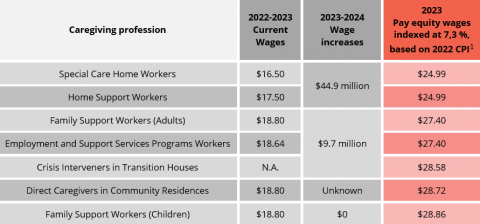Fredericton — The New Brunswick Coalition for Pay Equity credits the $54.6 million investment in care sector wages in the 2023-24 budget as being greater than last year.
The government will allocate $44.9 million in wage increases for personal support workers (PSW) in home support services and special care homes. It will also provide $9.7 million in increases for workers in group homes, community residences, family support services and attendant care.
"Once again, the government recognizes that better and more equitable wages are critical to employee recruitment and retention, but the sector is in crisis and the situation requires robust investment. With back-to-back budget surpluses, the government should have doubled down on reaching pay equity sooner," says Krysta Cowling, the Coalition's Chair. "Because workers in the sector are getting impatient. And that should worry the government."
This is the largest amount of funding granted for wage increases for the sector, exceeding the $38.6 million in the 2022-2023 budget. However, the government did not specify the hourly increase that will be allotted to each care service. And once again, the budget provides no additional funding for transition houses for women fleeing violence. The sector's recommendation for an increase in base funding was not heeded. The last, and only, increase was 11% in 2018 - with their public funding increasing from $2.97 million to $3.3 million.
"It is difficult to accurately predict the amount in hourly increases that will go into the pockets of care workers, but it will be insufficient to reach pay equity. The government must commit to achieving pay equity within a reasonable time frame. We hope government will develop a long-term action plan for the sector," adds Cowling.
Job evaluations, conducted by the Coalition for Pay Equity, revealed that equitable wages range from $24.99 to $28.86 per hour, depending on the service.

"We can't begrudge sector workers for seeking better paying jobs elsewhere if they are not being paid what they are worth, because pay equity is their right. When they remain in undervalued and underpaid jobs, they are in effect subsidizing the government. Especially when the government has been running a budget surplus for the past few years," adds Cowling. "This is a matter of choice. And our rights and access to care should never be a matter of political will."
